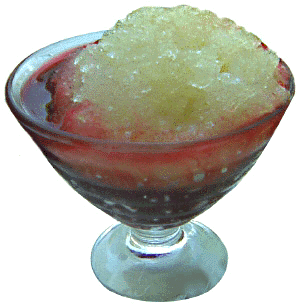...Best of Sicily presents... Best of Sicily Magazine. ... Dedicated to Sicilian art, culture, history, people, places and all things Sicilian. |
by Roberta Gangi | ||
Magazine Index Best of Sicily Arts & Culture Fashion Food & Wine History & Society About Us Travel Faqs Contact Map of Sicily |
Why the confusion? Outside Italy it used to be common to sell granular crushed ice - from cubes or even large blocks of solid ice - made with artificial flavors formulated with sweetened syrups as something akin to granita. The kinship was a distant one. So how is real granita made? Cold water, chopped fresh fruit (and its juice) and sugar are placed in a vat and the mixture is slowly churned at freezing temperatures until the flakes are formed. Then the granita must be churned continuosly, and slowly so that it doesn't solidify into a block. As you can imagine, there are granita machines to do this work. In the old days, before electricity, ice was scraped off of large blocks into flakes. It was never simply crushed. The modern process offers the benefit of the fruit juice and pulp being infused into the ice flakes. Berries and citrus are the most common flavors. Lemon granita is literally bittersweet. Strawberry is common, and mulberry, gelsi in Italian, is a rare delight. (Shown here is lemon granita with a dash of red mulberry.) Of course, hardly anybody chews granita. The ice flakes melt on your tongue. There's no need to suck on them. Sicilian ice cream differs from granita in that it contains milk or cream, and perhaps some starch. In earlier times ice cream was made from snow. The origins of granita are closer to those of sorbet, which is icy but has a very fine consistency. Frozen coffee (caffé freddo) is churned in granita machines. Think of it as coffee granita. About the Author: Roberta Gangi has written numerous articles and one book dealing with Italian cultural and culinary history, and a number of food and wine articles for Best of Sicily Magazine. | |
Top of Page |
 May is the beginning of granita season.
May is the beginning of granita season.